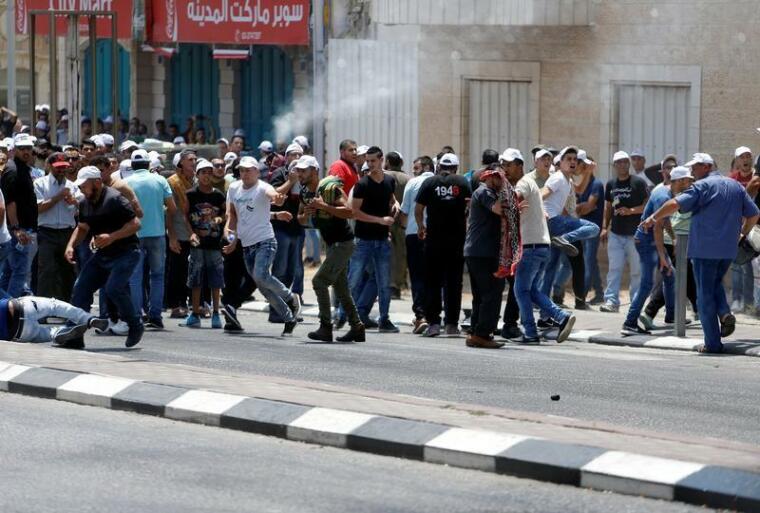Israel refuses to remove metal detectors outside Jerusalem mosque despite protests

Israel has refused to remove the metal detectors outside a major Jerusalem mosque despite the violent protest that occurred near the site on Friday.
The metal detectors were installed by Israeli authorities at entrances to Al-Aqsa mosque plaza after two police guards were shot dead on July 14.
Reuters reported that Palestinian President Mahmoud Abbas stated that he would halt security ties with Israel until the metal detectors are removed from the gates of the mosque.
On Friday, thousands of Muslims avoided the mosque and prayed on the narrow alleyways of the Old city's Muslim Quarter and the streets outside the Old City in protest of the new Israeli security measures.
According to Israel Police spokesman Micky Rosenfeld, only "several hundred" worshippers prayed inside the mosque, which is usually attended by more than 50,000 Muslims on a typical Friday.
After the prayers, hundreds of young Muslim men and boys started throwing rocks at the Israeli security personnel spread out across the Old City and elsewhere in Jerusalem.
Three Palestinians were killed in East Jerusalem and the West Bank, and more than 200 people were injured.
Many Muslims saw the metal detectors as an Israeli attempt to impose its sovereignty over the Temple Mount. The site, known to Muslims as the Haram al-Sharif, is considered to be the third holiest place in Islam after Mecca and Medina.
"It's not an issue of security. It's an issue of who controls the house of Allah. The Temple Mount is and must remain Muslim," said Khaled Moghrabi, a resident of the Muslim Quarter.
Tzachi Hanegbi, the Israeli minister for regional development, has firmly stated that the metal detectors will not be removed.
"They (metal detectors) will remain. The murderers will never tell us how to search the murderers," he told Army Radio, according to Reuters. "If they (Palestinians) do not want to enter the mosque, then let them not enter the mosque," he added.
The violent protests on Friday and Saturday have prompted the United Nations Security Council to convene a meeting to seek ways of calming the situation.
Jason Greenblatt, U.S. President Donald Trump's special representative for international negotiations, was sent by Washington to Israel on Sunday evening in hopes of helping to reduce the tensions.
"President Trump and his administration are closely following unfolding events in the region," he said. "The United States utterly condemns the recent terrorist violence," the official added.
 Christians don't have to affirm transgenderism, but they can’t express that view at work: tribunal
Christians don't have to affirm transgenderism, but they can’t express that view at work: tribunal Archaeology discovery: Medieval Christian prayer beads found on Holy Island
Archaeology discovery: Medieval Christian prayer beads found on Holy Island Presbyterian Church in America votes to leave National Association of Evangelicals
Presbyterian Church in America votes to leave National Association of Evangelicals Over 50 killed in 'vile and satanic' attack at Nigerian church on Pentecost Sunday
Over 50 killed in 'vile and satanic' attack at Nigerian church on Pentecost Sunday Ukrainian Orthodox Church severs ties with Moscow over Patriarch Kirill's support for Putin's war
Ukrainian Orthodox Church severs ties with Moscow over Patriarch Kirill's support for Putin's war Islamic State kills 20 Nigerian Christians as revenge for US airstrike
Islamic State kills 20 Nigerian Christians as revenge for US airstrike Man who served 33 years in prison for murder leads inmates to Christ
Man who served 33 years in prison for murder leads inmates to Christ


 Nigerian student beaten to death, body burned over ‘blasphemous’ WhatsApp message
Nigerian student beaten to death, body burned over ‘blasphemous’ WhatsApp message 'A new low': World reacts after Hong Kong arrests 90-year-old Cardinal Joseph Zen
'A new low': World reacts after Hong Kong arrests 90-year-old Cardinal Joseph Zen Iran sentences Christian man to 10 years in prison for hosting house church worship gathering
Iran sentences Christian man to 10 years in prison for hosting house church worship gathering French Guyana: Pastor shot dead, church set on fire after meeting delegation of Evangelicals
French Guyana: Pastor shot dead, church set on fire after meeting delegation of Evangelicals ‘Talking Jesus’ report finds only 6% of UK adults identify as practicing Christians
‘Talking Jesus’ report finds only 6% of UK adults identify as practicing Christians Mission Eurasia ministry center blown up in Ukraine, hundreds of Bibles destroyed: 'God will provide'
Mission Eurasia ministry center blown up in Ukraine, hundreds of Bibles destroyed: 'God will provide' Church holds service for first time after ISIS desecrated it 8 years ago
Church holds service for first time after ISIS desecrated it 8 years ago Burger King apologizes for 'offensive campaign' using Jesus' words at the Last Supper
Burger King apologizes for 'offensive campaign' using Jesus' words at the Last Supper Uganda: Muslims abduct teacher, burn him inside mosque for praying in Christ’s name
Uganda: Muslims abduct teacher, burn him inside mosque for praying in Christ’s name